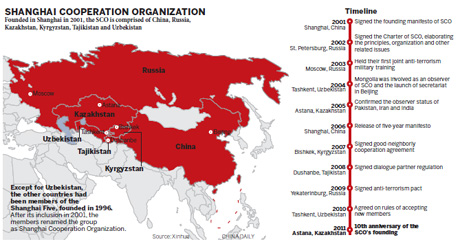Foreign and Military Affairs
Hopeful members knocking on SCO's door
By Cheng Guangjin (China Daily)
Updated: 2011-06-16 07:39
 |
Large Medium Small |
After the memorandum, the group will start consultations with India, Pakistan and Iran, which have applied for full membership in the SCO.
The memorandum will lay further legal foundations for the group to take in new members, and expert panels will discuss details such as finances.
The SCO, founded in 2001 to boost regional security and economic cooperation, currently involves China, Kazakhstan, Kyrgyzstan, Russia, Tajikistan and Uzbekistan.
Mongolia became the first country to receive observer status at the 2004 Tashkent Summit. Pakistan, India and Iran received observer status at the 2005 summit in Astana.
 Click for a larger picture |
Belarus and Sri Lanka are ranked as dialogue partners.
Analysts said that more members will enlarge the group's global influence, but the SCO is cautious about expansion to avoid inefficiency.
"The SCO has stressed pragmatic cooperation. It doesn't want to become a hollow organization and it tries to avoid bureaucracy, and so has been prudent in expansion," said Zhao Mingwen, research fellow at the China Institute of International Studies.
Zhao said the SCO opens it door to all countries that hold the same stance, "but it doesn't mean all the applicants will be accepted."
Iran applied for full membership in 2008, but it doesn't satisfy one of the SCO's charter articles that nations under international sanctions will not be allowed to join.
Pakistan wants to be a full-fledged member of the SCO, Pakistan President Asif Ali Zardari said in Astana on Tuesday following a meeting with his Kazakh counterpart, Xinhua reported.
Indian External Affairs Minister S. M. Krishna represented India at the summit to secure full membership, according to the Asian News International based in Delhi.
The situation with India and Pakistan is even more complicated, said Wu Hongwei, researcher with the Institute of Russian, Eastern European and Central Asian Studies under the Chinese Academy of Social Sciences.
"If these two countries joined the SCO, they are likely to bring their unsolved disputes into the organization," Wu cautioned.
Wu said applicant countries' relationships with member states, especially economic and security cooperation, will also be taken into consideration.
Afghanistan has applied for observer status, which was to be discussed among the member states on the summit, Secretary-General of SCO Muratbek Imanaliyev told reporters earlier this month in Beijing.
The SCO has been playing an active role in restoring peace and stability in Afghanistan, which borders most of its member states, as the United States prepares to withdraw its troops.
Wu Jiao in Astana contributed to this story.

| 分享按钮 |



